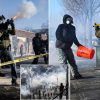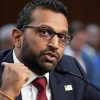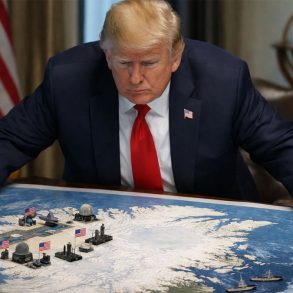President Donald Trump is turning his focus toward Chicago after another deadly holiday weekend, threatening to send in both the National Guard and federal immigration agents despite resistance from Illinois leaders. In a series of posts on Truth Social, Trump declared, “Chicago is the worst and most dangerous city in the World, by far. Pritzker needs help badly, he just doesn’t know it yet. I will solve the crime problem fast, just like I did in D.C. Chicago will be safe again, and soon.” He also warned Governor J.B. Pritzker directly: “We’re coming.”
Trump escalated his rhetoric further by labeling Chicago “the murder capital of the world.” He told his supporters that refusing federal law-and-order assistance was “dangerous” and “deadly for the residents.” The president pointed to his deployment of troops in Washington, D.C. earlier this summer as a model, saying, “Wow! Mayor Muriel Bowser of D.C. has become very popular because she worked with me and my great people in bringing crime down to virtually nothing in D.C. Wouldn’t it be nice to say that about Chicago, Los Angeles, New York, and even the crime drenched city of Baltimore?”
A Violent Labor Day Weekend
Trump’s statements came on the heels of one of the bloodiest weekends Chicago has seen this year. At least 58 people were shot, eight of them fatally, according to police. Gunfire erupted across the city in at least 37 separate incidents between Friday evening and Monday night. Victims included a 17-year-old girl struck by a bullet that entered her home through a front window, as well as men and women caught in crossfire on busy streets.
Among the most shocking incidents was a mass shooting in the Bronzeville neighborhood late Saturday night. A vehicle drove by a group gathered outside on South State Street, and at least one occupant opened fire, wounding seven people. Although all survived, police said the victims ranged from 28 to 32 years old and were hospitalized with injuries to their legs. No arrests have been made.
Other fatal shootings stretched across the city. In the South Shore neighborhood, two women were hit, one of them fatally, inside an apartment complex. In East Garfield Park, a 29-year-old man was gunned down in broad daylight while standing outside. In Altgeld Gardens, a 43-year-old woman was fatally shot by five armed men. In Pilsen, West Inglewood, Pullman, Little Village, Oakland, and West Elsdon, more lives were lost, including a 26-year-old woman killed during a verbal altercation and a 48-year-old man struck multiple times while standing outside his home.
The relentless violence highlighted the struggle city leaders face, even as official statistics show shootings down 37 percent and homicides down 32 percent compared to last year.
Pritzker Rejects Federal Intervention
Governor J.B. Pritzker has been blunt in his opposition to Trump’s threats. Speaking at a news conference, he said, “Do not come to Chicago, you are neither wanted here nor needed here. Donald Trump wants to use the military to occupy a U.S. city to punish its dissidents and score political points. If this were happening in any other country, we would have no trouble calling it what it is – a dangerous power-grab.”
In an exclusive interview with NBC Chicago, Pritzker confirmed that his office had been told federal immigration agents will soon expand operations in the city. The call came from Border Patrol sector chief Gregory Bovino, who oversaw similar operations in Los Angeles. “[They said] they will begin operations here sometime in the coming week,” Pritzker explained, noting that no specific numbers were given.
Pritzker has insisted that Chicago’s violence requires investment in law enforcement, not military crackdowns. “If the president wants to bring crime down further, he can stop defunding crime prevention and also help the state hire more FBI and ATF agents,” he said. He also argued that using the National Guard would be “illegal” unless there were a true insurrection.
Mayor Johnson’s Countermove
Chicago Mayor Brandon Johnson has also taken a hard line. On August 30, he signed the “Protecting Chicago Initiative,” an executive order meant to block cooperation with federal patrols. The order requires federal officers to identify themselves and wear body cameras, forbids city police from assisting in immigration enforcement, and directs legal challenges against federal actions.
Johnson explained his reasoning: “We have received credible reports that we have days, not weeks, before our city sees some type of militarized activity by the federal government. We take these threats seriously and we find ourselves in a position where we must take immediate, drastic action to protect our people from federal overreach.” He also warned that Trump’s approach was “uncoordinated, uncalled for, and unsound” and could “inflame tensions between residents and law enforcement.”
Supporters Praise Trump, Critics Cry Overreach
Supporters of Trump say his threats are overdue. They argue that Chicago has failed to handle its own crisis and that federal help is necessary to protect innocent residents. Trump himself has framed the issue as a matter of courage, saying of his D.C. intervention, “It’s not a miracle, it’s hard work, courage, and being SMART.”
But critics see something far more sinister. Governor Pritzker said Trump’s plan amounts to an invasion. Civil rights advocates warn that the presence of troops and ICE officers would escalate unrest rather than calm it. Mayor Johnson pledged that Chicago would use “any and every legal mechanism” to stop what he called “the most sweeping campaign of any city in the country to protect ourselves from the threats and actions of this out-of-control administration.”
If Trump decides to press forward, he faces significant legal obstacles. Just days ago, a federal judge ruled that his use of Marines and National Guard troops in Los Angeles violated the Posse Comitatus Act of 1878, which bars the military from enforcing domestic law except under extraordinary circumstances. Judge Charles Breyer wrote, “The evidence at trial established that Defendants systematically used armed soldiers… to set up protective perimeters and traffic blockades, engage in crowd control, and otherwise demonstrate a military presence.”
That ruling, currently on hold until September 12, casts doubt on Trump’s ability to deploy troops to Chicago without state consent. Pritzker stressed that while the president could attempt to federalize Guard units from other states, doing so would also be “illegal” in his view.
For now, Chicago braces for the arrival of ICE agents while awaiting clarity on whether National Guard troops will follow. Trump continues to promise that the city will soon be safe, while Pritzker and Johnson vow to fight what they see as unlawful federal overreach.
The standoff leaves Chicagoans in limbo: caught between a president determined to take control and local leaders determined to resist. With shootings claiming lives almost every weekend, the question is whether Trump’s threat will become reality—or whether courts and political opposition will stop it before the city sees soldiers on its streets.








